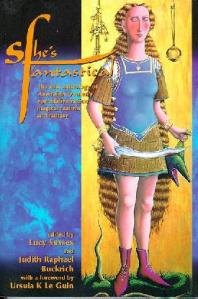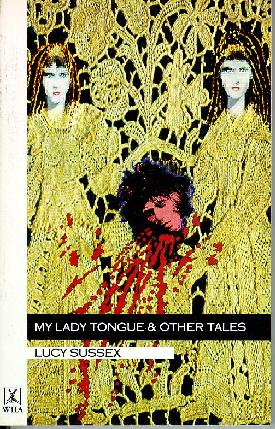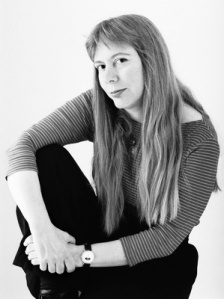As the next of my series featuring fantastic female fantasy authors (see disclaimer) I’ve invited the erudite and talented Lucy Sussex to drop by.
Watch out for the give-away question at the end of the interview.
 Q: You have a PHD and are a Senior Research Fellow at the University of Melbourne. And also lecturing at La Trobe University.
Q: You have a PHD and are a Senior Research Fellow at the University of Melbourne. And also lecturing at La Trobe University.
Your PhD thesis focused on early women crime writers and you describe yourself as a ‘literary archaeologist’. What a wonderful term! Does this mean you sift through original sources in university and state libraries, looking for references to and original manuscripts by long dead authors?
That is precisely what I do…
Q: What amazing things have you discovered?
So many good writers, so undeservedly neglected! Some examples: there was a novel with three female detectives, and centred on a murder mystery, four months before Poe’s ‘The Mysteries of the Rue Morgue’, widely and wrongly regarded as the birth of the detective genre. The novel was SUSAN HOPLEY: OR, CIRCUMSTANTIAL EVIDENCE, by Catherine Crowe. Or that Mary Fortune wrote 500 crime stories in the AUSTRALIAN JOURNAL, the longest known early crime series, worldwide.
I have an article in the next issue of SOUTHERLY on Agnes Murphy, best known as the first biographer of Melba, but who wrote an 1895 novel that can be best described as a lesbian MY BRILLIANT CAREER…
 Q: Your speculative fiction stories have won Ditmar Awards, Aurealis Awards and the Sir Julius Vogel Award. You have judged for the James Jr. Award. Having sat on both sides of the fence what insights can you give us into award judging?
Q: Your speculative fiction stories have won Ditmar Awards, Aurealis Awards and the Sir Julius Vogel Award. You have judged for the James Jr. Award. Having sat on both sides of the fence what insights can you give us into award judging?
It’s a lottery. So much depends on what the judge brings to the judging table, and the method used in cutting to the chase, the really worthwhile texts. I am no respecter of literary reputation, and that a book is hyped makes me regard it with suspicion. But so many people are afraid to take a book on its own merits, without the PR framing!
The Tiptree award judging (my first major act of judging) produced a kind of group mind, in that the judges were reading the books and commenting on them over a long period of time. We had to, as we had to decide on the definition of what the award honours: fiction that explores and expands notions of gender (for this reason I regard the Norma Hemming as superfluous. Her name should have given to something else, like a drama award). Other judging involved such things as a table full of books, and the repeated question: ‘Can we toss this book aside, or does it have any merits?’
I would also add that any judge worth their salt should consider the text, and not the writer, however obnoxious they may be.
So, in retrospect, I can say that any award that involves me is liable to come out unexpected, simply because I don’t have mainstream taste. And as for any award honouring me…well, I hope it proves that the judges showed taste and discernment!
 Q: You’ve edited several anthologies, including She’s Fantastical, which was shortlisted for the World fantasy Award. Your edited works are a glimpse of the range of your interests. They include: A selection of autobiographical writing by Mary Fortune (a nineteenth century woman who wrote about the gold fields), two anthologies of Fortune’s crime short stories, a mystery book by Ellen Davitt which was first published in 1865 and would have been lost if you hadn’t recovered it, two anthologies of YA spec fic and a YA crime anthology. Plus I’ve just finished reading ‘Saltwater in the Ink’ letters and journals of
Q: You’ve edited several anthologies, including She’s Fantastical, which was shortlisted for the World fantasy Award. Your edited works are a glimpse of the range of your interests. They include: A selection of autobiographical writing by Mary Fortune (a nineteenth century woman who wrote about the gold fields), two anthologies of Fortune’s crime short stories, a mystery book by Ellen Davitt which was first published in 1865 and would have been lost if you hadn’t recovered it, two anthologies of YA spec fic and a YA crime anthology. Plus I’ve just finished reading ‘Saltwater in the Ink’ letters and journals of  people travelling between Australia and the UK in the nineteenth century. There’s a broad spectrum here. What attracts you to a certain project?
people travelling between Australia and the UK in the nineteenth century. There’s a broad spectrum here. What attracts you to a certain project?
With the historical anthologies, a voice or voices that demanded to be heard anew. With the YA anthologies, because a publisher asked me to do it. I prefer anthologies of dead writers–you don’t have to write polite rejection letters.
With SALTWATER I literally sold the anthology because I was drunk and loud at a publisher’s party. I was talking to film critic Jim Schembri (a man of taste and discernment, unlike usual the ignorant yahoos infesting the film review pages) about MASTER AND COMMANDER, and mentioned I’d been reading C19th travel diaries, and how wonderful they were. An illustrator who was part of the conversation ducked off and returned with the publisher, who stood and listened, then said: ‘Can we have a proposal?’ I then had to reconstruct what the hell I had been talking about, the conversation having moved on somewhat.
As it happened, the GFC put paid to that project, but on the third attempt it found a home.Which only proves that it pays to persist.
 Q: Your novels range from children’s books like The Revongnase, through YA books like Black Ice to your novel which won the Ditmar, The Scarlet Rider. Do you have another book length fiction project under development?
Q: Your novels range from children’s books like The Revongnase, through YA books like Black Ice to your novel which won the Ditmar, The Scarlet Rider. Do you have another book length fiction project under development?
I have a project to co-write, on Australian writers and journalists in London at the turn of last century (which includes Agnes Murphy). And a novel that is in limbo until I can get some uninterrupted time. There is also another anthology (of the dead) planned.
Q: You’re an award winning short story writer. (See here, here and here for anthologies of Lucy’s stories. Read a review of A Tour Guide in Utopia). I remember reading one of your stories, The Sentenielle, the year I was judging on the horror Aurealis Awards panel and was delighted when it won a Ditmar. The visuals still return to me now and then, along with a little shiver. I’m a big fan of Saki. Was there a short story writer who first inspired you?
Aha! You spotted Saki. Also James Tiptree Jr, Le Guin’s short stories,and Chekhov. It is a very hard medium to work in successfully, but when it goes right it is the happiest of literary homes.
Q: You review for the Melbourne paper, the Sunday Age. (See some of Lucy’s book reviews). Do you think reviewing is good discipline for a writer?
It gives you an understanding of the market. It gives you great joy with marvellous writers whom you have never heard of before, and despair at the crap that is so easily published, it seems.
Q: Due to your research Mary Fortune and Ellen Davitt’s original crime stories and books from the mid nineteenth century have been recovered for posterity. (See here for Lucy’s work on crime writing). You are a member of Sisters in Crime and you released a book in 2010: Women Writers and Detectives in Nineteenth Century Crime Fiction:  Mothers of the Mystery Genre. You say ‘Contrary to popular belief, Conan Doyle, Wilkie Collins and Edgar Allen Poe did not invent the crime genre.’ In a review Kate Watson said ‘perhaps had nineteenth-century women writers been accorded the same status as male authors such as Poe – or even been acknowledged – then similar texts detailing women’s international influence might have materialised. It was not until 2010 that Sussex filled the previously unmarked space with her book.’
Mothers of the Mystery Genre. You say ‘Contrary to popular belief, Conan Doyle, Wilkie Collins and Edgar Allen Poe did not invent the crime genre.’ In a review Kate Watson said ‘perhaps had nineteenth-century women writers been accorded the same status as male authors such as Poe – or even been acknowledged – then similar texts detailing women’s international influence might have materialised. It was not until 2010 that Sussex filled the previously unmarked space with her book.’
The point I was trying to make was that they were acclaimed and best-selling IN THEIR TIME. It was only retrospectively that they were relegated to the margins by the self-styled canon makers. Who are active in every litery genre, and should be exterminated for the vermin they are. In the 1980s there was a huge amount of research and publication done on mothers of various literary genres, from Mary Shelley to female dramatists. Crime was a gap in this genre research, due to its sheer size. It is estimated that there were 5000 crime novels in English between 1800-1900, to say nothing of works in French and the multitudinous crime short stories. I only read a fraction of the texts concerned, and there are many more mothers of crime to be rediscovered.
 Q:You are also known as a feminist writer.
Q:You are also known as a feminist writer.
And proud of it!
Q: I believe you are involved in organising a new literary award for female writers. Can you tell us a little about it, or is it still hush hush?
If you mean the Stellas (to redress the appalling gender imbalance of the Miles Franklins), then that’s not me, though I support the notion.
Q: As well as being a writer of speculative fiction, you also write crime and your short story The Fountain of Justice was shortlisted for the Ned Kelly Award in 2010. I’ve come across quite a few spec fic authors who also write crime. Why do you think there is this cross over? Is it something about building a world and building a mystery that attracts a certain type of mind?
It has to do with narrative: both sf and crime are narrative-driven and similar in their intellectual rigour and concern with plot. They also both derive from the Gothic, that Pangaea of modern literatures.
 Q: I was prompted to start this series of interviews because there seems to be a perception in the US and the UK that fantasy is a bit of a boy’s club. Do you think there’s a difference in the way males and females write fantasy?
Q: I was prompted to start this series of interviews because there seems to be a perception in the US and the UK that fantasy is a bit of a boy’s club. Do you think there’s a difference in the way males and females write fantasy?
We have fewer rape scenes, and more convincing female characters.
Q: Following on from that, does the gender of the writer change your expectations when you pick up their book?
I would hope it didn’t. I nearly cheered aloud when a student told me she had got halfway through W. G. Sebald’s THE RINGS OF SATURN before realising the author was a man.
 Q: And here’s the fun question. If you could book a trip on a time machine, where and when would you go, and why?
Q: And here’s the fun question. If you could book a trip on a time machine, where and when would you go, and why?
Babylon in the Akkadian era, to meet Tapputi, the first woman chemist (and perfumier), who figures in my story ‘Alchemy’. Or to a party given by C19th crime writer Mary Braddon, who was not only a great writer and great company, but pals with the likes of Conan Doyle, Wilkie Collins, Bram Stoker and Oscar Wilde.
Lucy has a copy of either ‘She’s Fantastical’ or ‘Saltwater in the Ink’ to give-away.
Give-away Question:
If you could have a dinner party to meet your favourite writers from the past, who would you invite? And what would you serve them?
Lucy’s Blog. On my webpage, which needs updating

Interesting question! I’d love to meet Dorothy Sayers, and recreate a meal (and all the wine…) from one of her Wimsey novels! I would love to read your book – hope I win!
Jane Austen and Mary Shelley and just to give them a taste of something different I’d treat them to a classic aussie BBQ pavlova and all! Great interview 🙂
I’d like to invite Stella Miles Franklin so we could discuss her award & implicit bias against women and I’d go Mars Bar cheesecake.
I’d also invite Arthur Conan Doyle and introduce him to modern scepticism and have a few kind words about fairies at the bottom of his garden. I suppose I’d have some Pims on hand just to help him cope with the Australian weather.
JRR Tolkien, to ask what the hell Bombadil was doing in Lord of the Rings and to show him snippets of the movies .
Beatrix Potter, because I think she would compliment the other guests, being widely educated – I suspect she and Tolkien could talk children’s writing, she’d talk science with Doyle and her and Franklin could discuss difficulties in getting published as a woman.
Oh and I would have called Austen to help with the dinner arrangements before lending her my copy of Pride and Prejudice with Colin Firth emerging from the lake. Then we would debrief after the party and make erroneous judgements on each of the authors motives and actions.
I’d consider inviting Byron, but on second thought probably meet him at the pub after, I suspect he’d drink me under the table if both started at the same time.
I’m going through a Charles Dickens phase. I just want to take LITTLE DORRIT home & care for her & BLEAK HOUSE – superb characters. So Mr Dickens, come to tea. Something hearty I think. My Shepherds Pie & Port Wine Trifle. Let the wine & conversation flow. Tell me about this grey world you live, breathe & write about.
I would entertain Bram Stroker and Mary Shelly because i thing it would be fasinating to hear there view on the world as it is now compared to there own times . I would consider inviting C.S lewis as
well to ask him why he wrote The Magicians Newphew .I would serve some beautiful red capsium tarts with a light green salad followed by a fantastic W.A lamb roast with garlic and rosemary , yummy roast vegables sweet potato bake ,and for desert my amazing Pavola with fresh peaches,strawberrys and cream .I would of course offer some beautiful West Australian wines to drink .
Pingback: Is William Herbert’s Dirk Ericson Like Fictional Detectives of His Era? | timprasil
Pingback: Dirk Ericson: America’s First (Occult) Detective? – The Merry Ghost Hunter